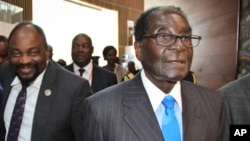Zimbabwean President Robert Mugabe - Africa’s 3rd longest-serving leader -- won applause and praise last month when he stood before the African Union and accepted its chairmanship. Critics of the autocratic leader -- and there are many -- say he is a poor choice if the continental body wants to win global respect. But other observers say he’s unlikely to rock the boat.
Mugabe may seem a strange choice to head the African Union, a continental body which strives to present a calm, collective African front to the world.
After all, the 90-year-old has publicly slammed European nations, calling them “colonizers and imperialists,” and he’s been sanctioned or banned by many Western nations for allegedly rigging elections, stifling opposition and committing human rights abuses during his three-decade reign.
While his appointment late last month raised eyebrows around the world, several African states have accepted his new post with a shrug -- with South Africa’s foreign minister said this week that the nation has “no qualms” about the choice.
Analyst Dimpho Motsamai of the Institute of Security Studies said his appointment is largely procedural, as the post rotates among leaders from Africa’s four regions.
Motsamai, who is based in Pretoria, notes that the job also comes with a powerful constraint -- the chair must defer to the head of the AU Commission, the permanent administrative and policy engine of the AU.
And, she noted, it’s not like it’s the first time a divisive figure has headed the union. In 2009, the post went to Libyan leader Moammar Gadhafi, who had no luck in his quest to form a “United States of Africa” -- or to extend his tenure as AU chair beyond the one-year limit.
“If you look at the list of past chairs, there’s been countries that may relatively be seen as worse than Zimbabwe or worse than Mugabe in terms of violating people’s democratic rights. We had Mauritania last year, the previous year was Ethiopia … we had Benin in 2013, and Equatorial Guinea in 2012. So in comparison to past years, I don’t think he is all that bad,” she said.
She said he’s unlikely to tussle with the commission, or to blaze a trail when it comes to sticky issues, like the recent trend of African leaders attempting to change the constitution to extend their term limits.
But, she noted, he also is likely to show inertia about speaking out on abuses of democracy - as he has proven in his job as chairman of the Southern African Development Community (SADC), a post he also holds currently.
“Mugabe will have a position if there is an AU position. If there is an AU position or consensus on that, he will be bound to promoting the same. What he’s not going to do is go out of his way to call out undemocratic regimes, yeah. Clearly because he has not been doing that on that level of SADC,” explained Motsamai.
But Mugabe’s critics say he’s still a poor choice for poster boy for African unity. Joy Mabenge is the regional coordinator for the Zimbabwe in Crisis Coalition in South Africa. He said Mugabe is old and increasingly at odds with himself -- posing a danger that he may say or do something that may cause an international incident.
“Age is fast catching up with him, in fact it has caught up to him. Those of you who are closer to the developments in Zimbabwe will tell you that in 2014, President Mugabe had begun to show lapses, memory lapses, serious memory lapses," stated Mabenge. "It’s not just about what the bureaucracy does, but it is also about what he will say representing these continental bodies and these subcontinental bodies like SADC.”
Mugabe’s own words do leave that possibility open. His AU acceptance speech -- a 25-minute ramble -- did feature some of his signature invective, but he also ticked off the many challenges the continent faces: terrorism, the Ebola outbreak and poor infrastructure, among others.
“During my tenure as chair, I will deliberately provoke your thoughts to pay special attention to issues of infrastructure, value addition and beneficiation agriculture and climate change in the context of Africa’s development,” he said.
But in true Mugabe fashion, he also added some spice. “African resources should belong to Africa and to no one else," said Mugabe. "Except to those we invite as friends. Friends we shall have, yes, but imperialists and colonialists no more.”
Mabenge said its talk like that that could cause trouble for the continent. "President Mugabe is not without his own controversies. In fact if anything he is right in the middle of trying to cleanse himself and trying to get his own country, Zimbabwe, back on track again," Mabenge added. "Zimbabwe has been a pariah state for quite a long time, it’s been so much isolated because of President Mugabe’s own flawed relationships with most [countries], particularly the West.”
Mugabe’s term lasts one year, which is sure to be an interesting one - but will it make a difference for this continent? The jury is out.




